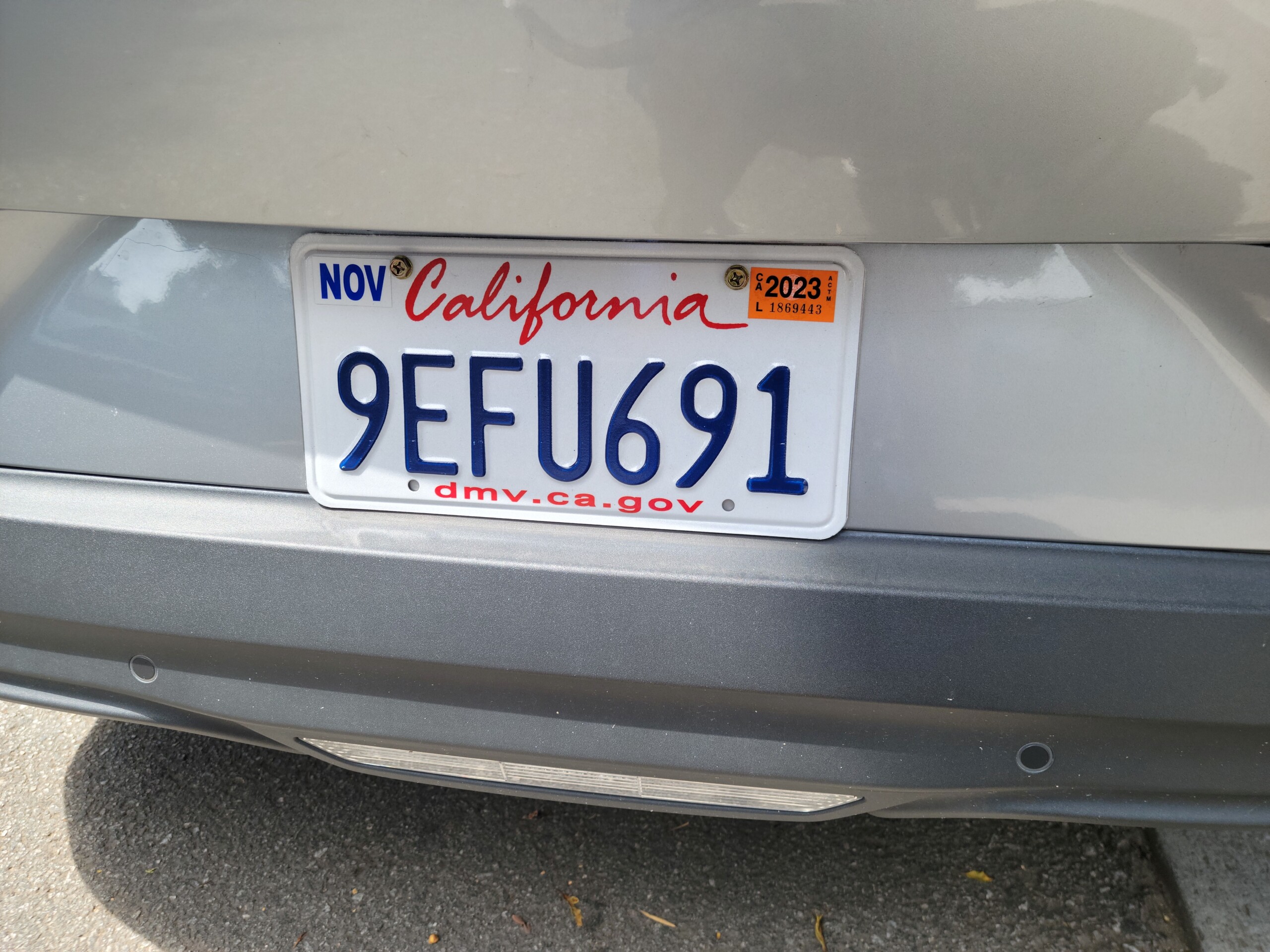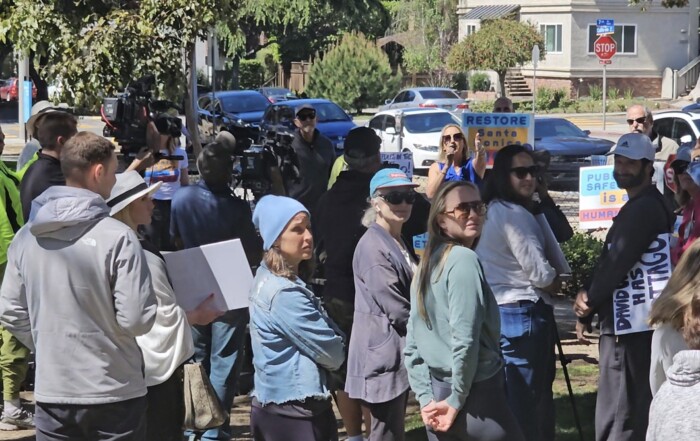On Monday evening, the Culver City Council agreed to move forward with a five-year contract with Flock Safety Group. The purpose? The installation of an automated license plate recognition system (ALPR). The use of the system also necessitated a discussion of the Culver City Police Department’s (CCPD) policy for license plate recognition.
In their presentation to the council, the CCPD made the case that the use of ALPRs provides a substantial community benefit, saying 70 percent of all crimes involve the use of a vehicle. They also identified Beverly Hills, Santa Monica, and the West Hollywood Division of the Sheriff’s Department as already having ALPRs in place.
ALPRs are typically fixed cameras attached to traffic lights at intersections. The cameras capture an image of a license plate and then analyze it across multiple crime databases. If a vehicle of interest is flagged by the system, an alert is “sent to patrol officers within seconds,” said the officer making the presentation. It lists the vehicle, what the vehicle is wanted for, and the vehicle’s last known location and direction of travel.
According to CCPD, in about 75 percent of all cases, vehicles are located and an arrest is made. The presenting officer argued that systems like the one proposed to the council have four distinct community benefits. They:
- Are effective in locating stolen vehicles that enter the city, Apparently, vehicle thefts are up 28 percent in Culver City
- Are effective in locating vehicles that were used in connection to felony offenses
- Provide CCPD with valuable leads to crimes being investigated in the city
- Detect vehicles with missing/at-risk individuals, such as Amber and Silver Alert victims
The presenting officer also complimented ALPRs for helping law enforcement agencies work together across departments and jurisdictions to solve crimes.
They also assured the council that ALPR technology does not include facial recognition technology, and is not used for surveillance. Further, only authorized users within the police department can access the data, and that data can only be used for law enforcement purposes. Those authorized users signing into the system must also log a reason for accessing the ALPR data, using a case number, for example. And no data gathered by the ALPR system proposed for Culver City would be shared with Immigration and Customs Enforcement (ICE).
Councilmember Freddy Puza asked about a discrepancy between the CCPD’s policy for ASPR use of data, which is to be the owners of it and only share it with other law enforcement agencies when necessary to assist a case, and Flock Security’s standard contract, which does not state limits on the company in terms of sharing data. A spokesperson for Flock explain that the company would not use any data specific to Culver City cases being investigated, but use it only to strengthen the system’s artificial intelligence abilities to learn and improve.
One resident, Jeff Schwartz, called into the meeting to ask council members to consider tabling the item until they can review the ACLU’s report on Flock Security, which is apparently very critical of the company, or to just vote it down. He says their report “Refutes most of what the police and Flock claim.”
Another caller, Stephen Jones, also had concerns with Flock Security, saying, “Even if you read a policy saying this data can’t be shared, the company you’re contracting with, Flock, has standard contractual terms that let them share footage with any law enforcement, for any reason, no matter what our policy says. You can’t trust these guys. Their representative just blatantly lied about the contract language.”
“While the implementation of this technology might seem like a useful tool to track down criminals, this technology has significant negative impacts on the privacy and civil liberties of our community,” said resident Bubba Fish. He added, “Flock is creating a massive nationwide surveillance system and will use our data as they see fit.” Fish also claimed the use of license plate readers has been shown to target communities of color.
Caller Margaret Peters echoed the previous callers and called the move to install the ALPRs “a dangerous precedent.” She also questioned how outside jurisdictions, even in California, could be held to following our police department’s stated policies.
Melissa Stucky somewhat countered those speakers when she said, “I think anything that can assist our CCPD is always a good thing as long as this doesn’t lead to overreach of government entities,” and later added, “For those of you with concerns about this technology, don’t think for a hot second that government isn’t already using camera-based systems everywhere already.”
Puza came out as opposed to the proposal. “I’ve heard from many community members who have deep concerns about increasing the police state, and increasing a network mass surveillance system.” He also added that he ran for council on a more equitable and inclusive city budget, adding, “I would rather see our budget go to investments in people, communities, and resources, and for the city to work on a care-first budget because a lot of these issues – not all – can be solved through prevention.”
Councilmember Dan O’Brien, who ultimately supported the proposal, did ask the Flock Security spokesperson about their contract language stating they have the right to share data broadly across state borders with multiple law enforcement jurisdictions. But the spokesperson insisted that the data would be owned by the CCPD. “The data is owned by your department,” he said. “Only they can share it.”
O’Brien rationalized his support on the fact that there is no facial recognition software and that cameras only take pictures of vehicles from behind. He ultimately didn’t think it was an issue to take photos of license plates, stating, “License plates are public documents.” He also pointed out the number of local or neighboring jurisdictions using ALPRs and suggested Culver City needs to catch up.
Councilmember Göran Eriksson made a point of the fact that the previous council had already budgeted for the implementation of the system, so financial considerations around the allocation of resources shouldn’t be an issue.
For Vice Mayor Yasmine-Imani McMorrin, this issue is about power, and who it is centered around if systems like this are in place. “There’s been consistent and documented concerns from folks of color, and particularly Black folks in our community, regarding police,” said McMorrin. “I was really concerned to see the RIPA [Racial and Identity Profiling Act] data confirming increased vehicular stops, and increased use of force, if you happen to be a Black person,”
With regard to the crisis in automotive catalytic converter thefts, McMorrin pitched more preventative approaches like engraving Vehicle Identification Numbers (VIN) onto catalytic converters to prevent resale if stolen, rather than investing in catching thieves after the fact through ALPRs.
She also voiced disappointment that there is less transparency coming from the police department on RIPA data, stating that reports that were once monthly are now only quarterly, and the fact that she’s not receiving even those regularly.
She also called the idea of keeping up with law enforcement in Beverly Hills, Santa Monica, and West Hollywood a “flimsy” argument given that other nearby jurisdictions also have protected bike lanes, something the current council majority removed in recent weeks from Culver City.
Mayor Albert Very stated that the council needs to acknowledge “there are some bad people out there,” saying the ALPR system “gives us one more tool to combat that.” He also said he thinks comparing RIPA data to the data the ALPR system would collect is falsely conflating the issue. “To say that this targets people of color or a disadvantaged community, it’s just not so.”
The five-year contract with Flock Security was adopted, 3-2, with Vera, Eriksson, and O’Brien in support. McMorrin and Puza voted no.
The photo image is of the author’s own car.
Stay informed. Sign up for The Westside Voice Newsletter
By clicking submit, you agree to share your email address with Westside Voice. We do not sell or share your information with anyone.








